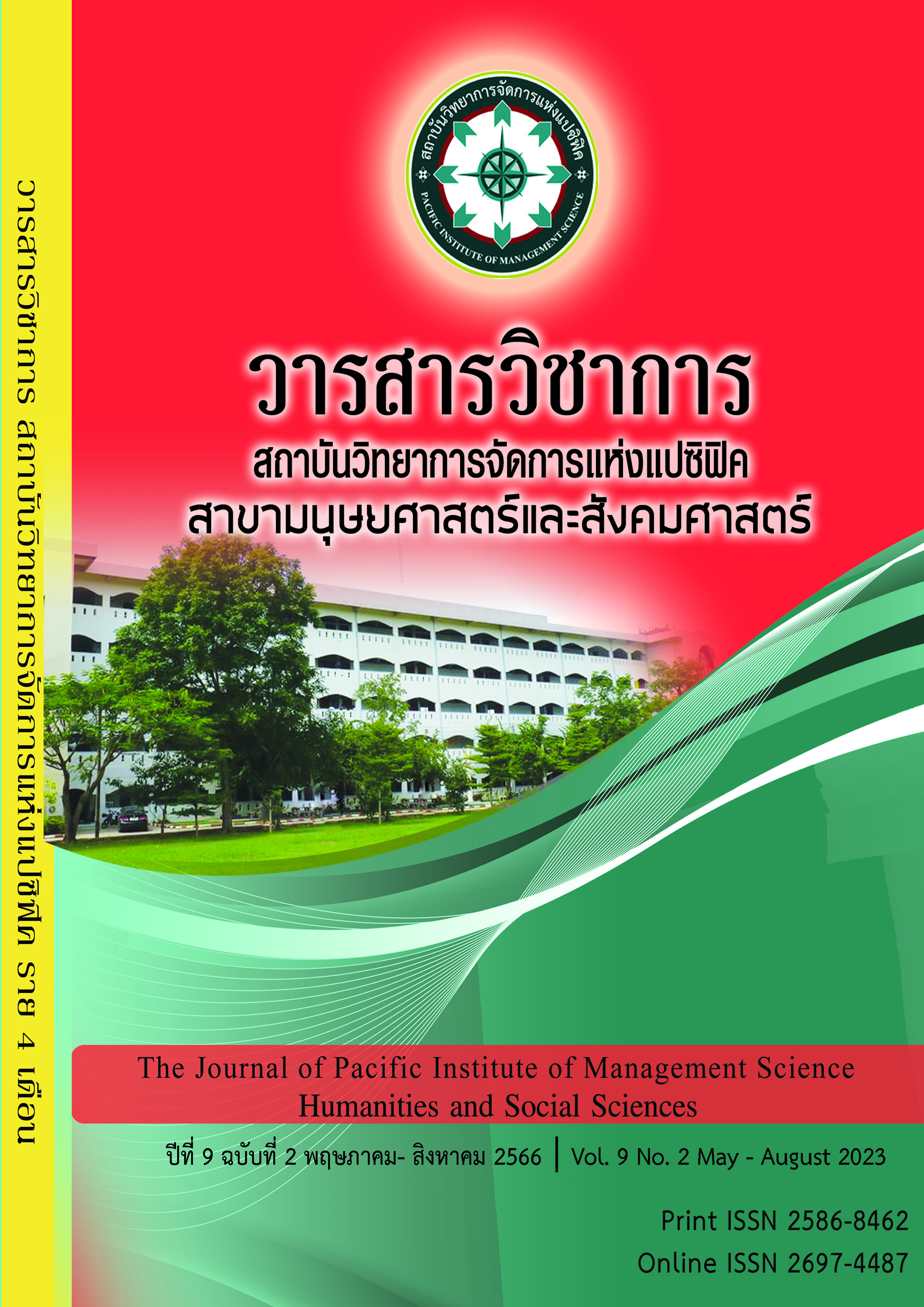The Transformational Leadership of Administrators Affecting Work Motivation of Employees of a Printed Circuit Board Manufacturing Company in Pathum Thani Province
Keywords:
Transformational Leadership, Work Motivation for Performance, Motivating Factor, Hygiene FactorAbstract
The purpose of this research was to study the transformational leadership of executives that affected the work motivation of employees of a printed circuit board manufacturing company in Pathum Thani Province. The questionnaire was used to collect data. The sample group in this research was 259 employees working in the production department using the proportional stratified random sampling method. Data were analyzed by statistical software packages, including percentage, mean, standard deviation, correlation, coefficient, and multiple regression analysis.
The results showed that the executive transformational leadership in terms of ideological influence, inspirational motivation, intellectual stimulation, and the individual aspect had a positive correlation and affects employee motivation. statistically significant at the level 0.05 level, predicting up to 92.50 percent (R2=0.925). The results from the research can be used as a guideline to promote work for greater efficiency and effectiveness.
References
กัลยา วานิชย์บัญชา. (2561). สถิติสำหรับงานวิจัย. พิมพ์ครั้งที่ 12. กรุงเทพฯ: สามลดา.
ชุติกาญจน์ จำลองกุล.(2563). โมเดลความสัมพันธ์ระหว่างภาวะผู้นำการเปลี่ยนแปลง ความยึดมั่นผูกพันในงานและผลการปฏิบัติงานของหัวหน้าหอผู้ป่วยโรงพยาบาลทั่วไป สังกัดกระทรวงสาธารณสุข.นครปฐม: ปริญญาปรัชญาดุษฎีบัณฑิต สาขาวิชาการบริหารการพยาบาล คณะสหวิทยาการ มหาวิทยาลัยคริสเตียน.
ธิริญญา เพ็ญญะ .(2562). ความสัมพันธ์ระหว่างแรงจูงใจกับประสิทธิภาพในการปฏิบัติงานของบุคลากรในส่วนการศึกษาโรงเรียนนายร้อยพระจุลจอมเกล้า จังหวัดนครนายก. วารสารสหวิทยาการวิจัย. 8(2), 153–161.
บุญชม ศรีสะอาด. (2560). การวิจัยเบื้องต้น. พิมพ์ครั้งที่ 10. กรุงเทพฯ: สุรีวิยาสาสน์.
ปพิชญา ศรีจันทรา. (2563). แรงจูงใจและประสิทธิผลการปฏิบัติงานของบริษัทขนส่งแห่งหนึ่ง ในเขตกรุงเทพมหานคร. กรุงเทพฯ: ปริญญาบริหารธุรกิจมหาบัณฑิต สาขาวิชาการจัดการ คณะบริหาร ธุรกิจเพื่อสังคม มหาวิทยาลัยศรีนครินทรวิโรฒ.
พิมพ์พร วงศ์อนุสิทธ. (2564). ภาวะผู้นำการเปลี่ยนแปลงของผู้บริหารสตรีที่ส่งผลต่อประสิทธิผลของโรงเรียน สังกัดสำนักงานเขตพื้นที่การศึกษาประถมศึกษาในจังหวัดนครพนม. สกลนคร: ปริญญาครุศาสตรมหาบัณฑิต สาขาวิชาการบริหารการศึกษา บัณฑิตวิทยาลัย มหาวิทยาลัยราชภัฏสกลนคร.
พัชรี พันธุ์แตงไทย. (2564). แรงจูงใจที่ส่งผลต่อประสิทธิภาพการปฏิบัติงานของบุคลากรสายสนับสนุน มหาวิทยาลัยราชภัฏอุตรดิตถ์. อุตรดิตถ์: ปริญญาบริหารธุรกิจมหาบัณฑิต สาขาวิชาบริหารธุรกิจ คณะวิทยาการจัดการมหาวิทยาลัยราชภัฏอุตรดิตถ์.
สำนักงานอุตสาหกรรมจังหวัดปทุมธานี. (2565). รายงานสภาวะเศรษฐกิจอุตสาหกรรม ราย 6 เดือน (มกราคม – มิถุนายน 2565). สืบค้นจาก https://pathumthani.industry.go.th/
อรวรรณ ภัทรดำเนินสุข. (2564). ภาวะผู้นำการเปลี่ยนแปลงของผู้บริหารกับแรงจูงใจในการปฏิบัติงานของครูในสถานศึกษา สังกัดสำนักงานเขตพื้นที่การศึกษาประถมศึกษาสมุทรสงคราม. วารสารสหวิทยาการมนุษยศาสตร์และสังคมศาสตร์. 4(3), 1172-1187.
Alderfer, C. P. (1972). Existence relatedness and growth. New York: The Free Press.
Avolio, B. J. (1999). Full Range Leadership Development, 2nd ed, California: SAGE Publication.
Bass, B. M. (1985). Leadership and Performance Beyond Expectation, New York: The Free Press.
Black, K. (2010). Business Statistics for Contemporary Decision Making. 6th ed.New York: John Wiley & Sons.
Herzberg, F. (1959). The Motivation to work. New York: John Wiley & Sons.
Maslow, A. (1970). Motivation and personality. New York: Harpers & Row.
Yamane, T. (1973). Statistics: An Introductory Analysis. New York: Harper & Row.
Downloads
Published
Issue
Section
License
Copyright (c) 2023 Pacific Institute of Management Science

This work is licensed under a Creative Commons Attribution-NonCommercial-NoDerivatives 4.0 International License.
บทความที่ได้รับการตีพิมพ์เป็นลิขสิทธิ์ของ สถาบันวิทยาการจัดการแห่งแปซิฟิค
ข้อความที่ปรากฏในบทความแต่ละเรื่องในวารสารวิชาการเล่มนี้เป็นความคิดเห็นส่วนตัวของผู้เขียนแต่ละท่านไม่เกี่ยวข้องกับสถาบันวิทยาการจัดการแห่งแปซิฟิค และคณาจารย์ท่านอื่นๆในสถาบันฯ แต่อย่างใด ความรับผิดชอบองค์ประกอบทั้งหมดของบทความแต่ละเรื่องเป็นของผู้เขียนแต่ละท่าน หากมีความผิดพลาดใดๆ ผู้เขียนแต่ละท่านจะรับผิดชอบบทความของตนเองแต่ผู้เดียว







